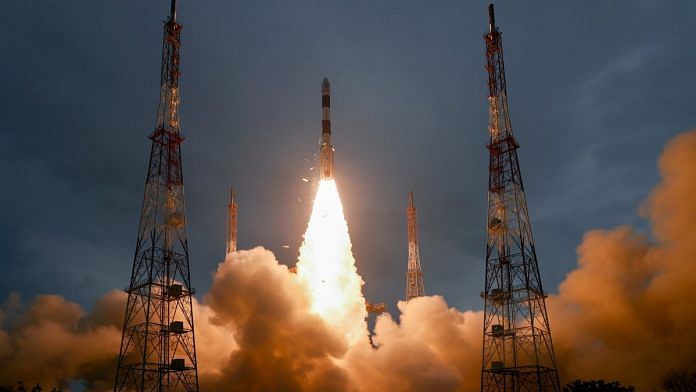Bengaluru: Under the Modi government’s vision of increased public-private partnership, private companies are expected to contribute to building launch vehicles and providing launch services, building satellites and providing satellite services, and providing “space-based services”, said India’s premier space agency Thursday.
At a webinar titled ‘Unlocking India’s Potential in Space Sector’, scientific secretary of Indian Space Research Organisation (ISRO), R. Umamaheswaran outlined the new proposed structure of this partnership, explaining the roles of different agencies and organisations involved, as well as policy updates required.
The bridging agency between the two sectors will be Indian National Space Promotion and Authorisation Centre (IN-SPACe), an autonomous, national-level nodal agency.
ISRO Chairman Dr. K Sivan, Principal Scientific Adviser to the govt Dr K. VijayRaghavan and members from private industry and academia were also part of the webinar.
Also read: These are the 2 steps Modi govt needs to take for its space reforms to take off
New partnership, new roles
The guiding principles for involving the private sector will be based on the Space Activity Bill, satcom (satellite communications) policy, remote sensing policy and navigation policy, among others.
The Department of Space (DoS) will help private players through the process and also aid in the creation IN-SPACe, which will be responsible for permitting and monitoring private sector space activities, licensing players, regulating said activities and facilitating use of ISRO facilities.
The nodal agency will also help promote industries, build launch vehicles and satellites, establish other facilities like launch pads inside DoS premises, monitor space-based services, and also provide supportive help to private players.
Further, it will be responsible for drawing up an Integrated Launch Manifest, which will set clear boundaries between the private sector, ISRO and one of ISRO’s commercial wings, the NewSpace India Limited (NSIL). It will have to also prevent conflict of interest between the bodies. Telecom Disputes Settlement and Appellate Tribunal (TDSAT) will work as an appellate body for conflict resolution.
ISRO said the process will get started with the enactment of the Space Activity Bill, a legislation that has come under repeated criticism by many in the private industry for not prioritising industry needs.
Also, the NSIL has been updated with new strategic mandates as IN-SPACe takes hold. Instead of being responsible for PSLV/SSLV launch vehicle production, providing launch services for customers and space services, NSIL’s role has been updated to owning and providing space services, building and launching satellites and launch vehicles through the Indian industry.
Also read: IISc, ISRO develops sustainable process for making brick-like structures on Moon
IN-SPACe set up
The nodal agency will have a board comprising members from the industry, academia, DoS and IN-SPACe itself, which will be chaired by a secretary-level officer who is fully empowered to take independent decisions.
IN-SPACe will have four directorates to run operations — technical, safety & security, legal and promotion & monitoring.
The technical directorate will be responsible for documentation, standards, and technical reviews. The safety and security directorate will oversee strategic interest, foreign policy and safety. The legal directorate will monitor compliance with the Space Activity Bill and other policies or regulations. The promotion and monitoring directorate will check for compliance to reliability and quality, while also working with private players by guiding them and promoting their activities.
Application process
To streamline and make user-friendly the process of private player application to IN-SPACe, ISRO stated that it has launched an online portal where applicants can submit their requests. These will then be looked at by the technical, legal, and the safety & security directorates, which will evaluate the applications and also list the kind of support and facilities needed. The approved applications will then be passed on to the IN-SPACe board for evaluation, permissions, support and follow through.
But these changes might not be sufficient to streamline the process, say some experts.
“What is still missing is the representation of critical departments like DoT, DoD, MHA, etc, that will have a say in space activities,” said Narayan Prasad, COO of satsearch.co, a global marketplace for space-technology products.
“Time capping all processes is another critical issue. IN-SPACe would also need to work on architecting new schemes to enable R&D investment by ISRO and change in procurement rules to ease procurement from startups.
Also read: Modi govt wants private sector in global space race, but it’s up to ISRO to make it happen



